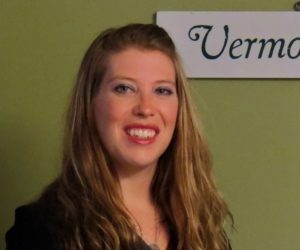- Fellowship
- Deanna Hartog
- Maya Tsukazaki
- Emily Kenyon
- Jill Martin Diaz (Rudge)
- Mairead O'Reilly
- Katelyn Atwood
- Jay Diaz
- Jessica Radbord
- Grace Pazdan
Katelyn Atwood, 2014-2016 Poverty Law Fellow
 Solving a Complex Puzzle
Solving a Complex Puzzle
Vermont Poverty Law Fellow Katelyn Atwood talks about helping Vermont veterans get the support they deserve.
How did you get started in law?
I grew up on a farm just east of Grand Rapids, Michigan, and studied political science and history at Alma College as an undergrad. At Alma, I took a lot of experiential courses that involved legal issues with a nearby Superfund site. I decided to go to Vermont Law School to study environmental law. But when I got to Vermont, I discovered something more interesting to me than the environment: people.
What happened to change your focus?
After my 1-L year, I worked as an intern at the South Royalton Legal Clinic. I focused on immigration cases that involved violence against women. You don’t really understand the power of the law until you can see how it can impact someone’s life. The law allowed these women to stay in the United States, and it kept them safe. I had never looked at the law in that way before.
How did you become a VBF Fellow?
I graduated from Vermont Law School in 2011. I clerked for a year, then worked for Montana Legal Aid for two years, doing primarily domestic violence and family law on Crow and Northern Cheyenne Indian reservations. I loved the work, but my husband and I wanted to get back to the East Coast to be closer to our families. The Fellowship was an opportunity to do that. I got to come back and work at the South Royalton Legal Clinic.
What are the advantages of the Fellowship?
First of all, the work I am doing helps qualify me for public service loan forgiveness. The Fellowship pays my salary for two years, and pays some of the overhead to the clinic. This has played a key role in the establishment of my current work, The Vermont Veterans Legal Assistance Project (VVLAP).
Can you tell us a bit about the project?
VVLAP was created in collaboration with the Access to Justice Campaign. We represent low-income veterans in both state civil cases and in Department of Veterans affairs disability cases.
What type of cases do you handle?
I’ll give you a couple examples. We had a veteran who had fallen behind on his child support payments and had accrued a large amount of interest payable to the state. We asked the court to reduce the accrued interest. Now he has a manageable payment per month, and he’s working to get his life back on track.
Another vet had lost his ability to work due to post-traumatic stress. We were able to get him disability through the Social Security system. Now we are working toward getting him additional disability payments through the Veterans’ Administration.
What do you enjoy about this work?
The best part is the clients. Veterans are a microcosm of society. But they all have this underlying sense of commitment and this sense that they can make things better, for themselves or for others. They chose to do a really hard thing because they wanted to do that. And they’re just so amazing, all of them.
In addition, VA disability law is a complex puzzle, and I really like solving it. You have to completely suspend your belief about how the outside world would function and step down the rabbit hole. The most difficult part is trying to explain this to clients. People think the government doesn’t care about them, and I tell them to remember that it’s nothing personal. What matters is the law, and whether or not we get a good result.
How has this work changed you personally and professionally?
Since I work with students from Vermont Law School, I have to explain and justify my approach. Because I have to do this all the time, I have become a better lawyer. It’s made me a better leader as well.
Personally, the project has made me a kinder person. You never know how disabled someone is. I have a client who is in his early 40s and you would never know that he has such a hard time getting through the day. You just never know what other people are going through. We all see veterans as this shiny thing, but they deserve better from us.
You Can Make a Difference
Your donation will help fund free and low-cost legal aid services in Vermont.
Donate Now